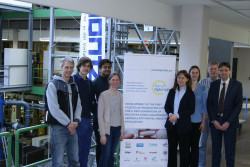Aerogels - the world's lightest solids: International project meeting of the EU project NanoHybrids
Scientific exchange between the partners is actively cultivated through mutual visits and joint workshops. Results have been submitted to the European Commission in the latest periodic report. The project meeting on 15 and 16 May 2017 in Hamburg sees the beginning of the second project phase. The European Commission project officer and the appointed reviewer will be present on both days to see for themselves the progress being made. A special highpoint of the meeting will be the visit to the Institute of Thermal Separation Processes laboratories at Hamburg University of Technology (TUHH). Here partners will also have the opportunity to view the new plant for producing aerogels. The goal of the EU project “NanoHybrids – New generation of nanoporous organic and hybrid aerogels for industrial applications: from the lab to pilot scale production” is to develop a pilot-scale production system for novel aerogels and test potential industrial applications. It is funded under Horizon 2020, the biggest EU research and innovation programme, as one of a series of projects charged with bridging the gap between nanotechnology research, pilot-scale production and markets. The Institute of Thermal Separation Processes led by Professor Irina Smirnova coordinates the project with the support of Tutech Innovation GmbH, a TUHH subsidiary. In the ‘Nanotechnologies, Advanced Materials, Advanced Manufacturing and Processing, and Biotechnology’ section of Horizon 2020 only two innovation projects have been coordinated by German institutes since 2014, one of them being NanoHybrids. In addition to TUHH (Institute of Thermal Separation Processes), the project involves well-known industry partners and research institutes, in particular BASF Polyurethanes GmbH, Dräger Safety AG & Co. KGaA, Nestlé and the German Aerospace Center (DLR Cologne). The project brings together a total of 12 international partners. The Institute of Thermal Separation Processes is incorporated in the research fields "Integrated Biotechnology and Process Engineering" and "Regeneration, Implants and Medical Technology" at TUHH. Research includes experimental and theoretical work on high-pressure engineering, supercritical fluids, thermodynamics of biologically relevant systems and downstream processes. Prof. Smirnova has been head of the institute since 2008. In the course of her scientific career she has worked at the University of St Petersburg, TU Berlin, University of Erlangen-Nuremberg and Sogang University in South Korea. Prof. Smirnova and BASF have been working together for many years. For the past six years their cooperation has centred on highly porous aerogels. As part of this bilateral cooperation, Prof. Smirnova and Dr Mark Fricke of BASF Polyurethanes GmbH have been working on drying an organic polyurethane aerogel to produce a high-performance insulation material that BASF has presented to the public under the SLENTITE® name. “The material has to be dried in a particular way so that it retains its special structure,” says Dr Fricke. “With the support of Prof. Smirnova and her team we have achieved this.” The result is a polyurethane aerogel in the form of a mechanically stable panel that is an outstanding insulator, handles well and is water vapour permeable. “Information and know-how from TUHH and BASF have come together in the project to create a new product,” adds Prof. Smirnova. BASF built the world’s first ever pilot plant for manufacturing organic aerogels in panel form in Lemförde in 2015. This plant will be used as part of the EU project for producing small aerogel particles on a larger scale. Web: www.nanohybrids.eu
Keywords
Countries
Germany



